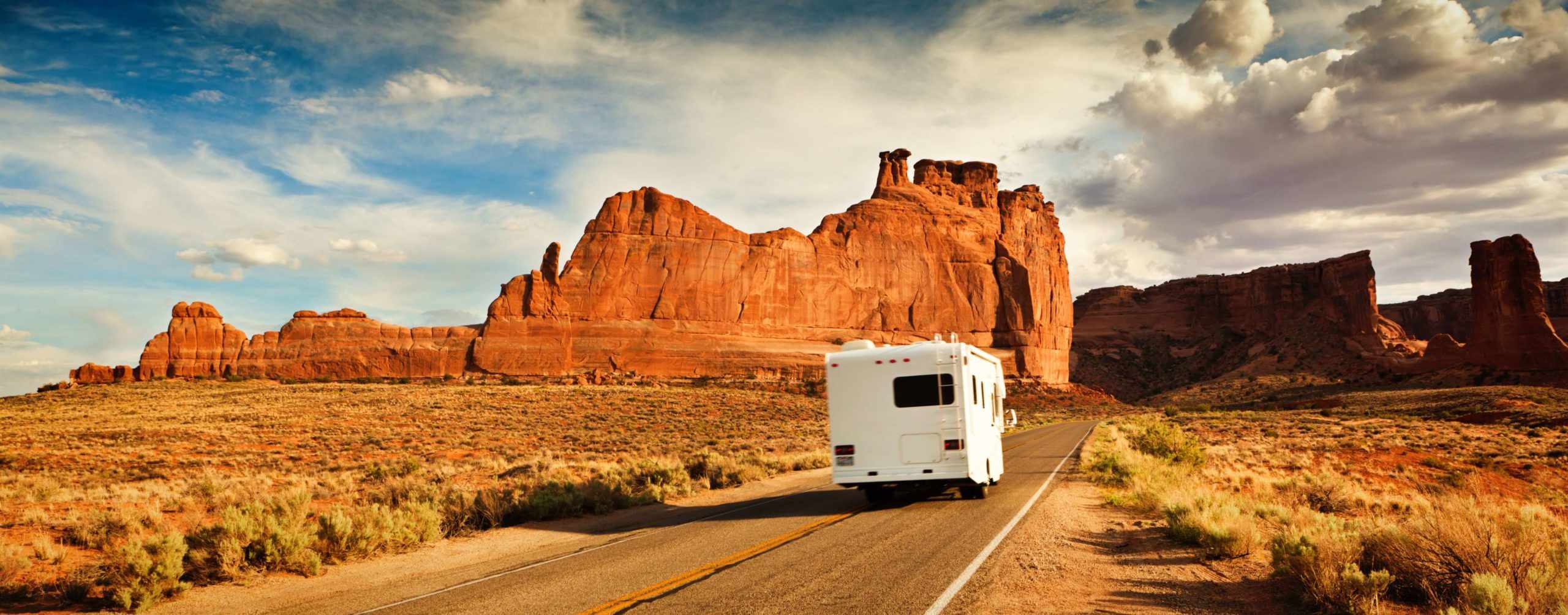“Do I need a special license to drive an RV?” and “Which RV class needs a special license?”
These are two common questions we are asked nearly every week at Outdoorsy…
Here is the simple answer: You don’t need a special license to drive most motorhomes.
According to current DMV laws in all 50 states, if you’re driving any vehicle under 26,000 pounds—and most RV classes are—you are clear to drive with a regular operator’s driver’s license.
Try Before You Buy: RVs for Rent Near You
Why Knowing Your RV Weight is Important for Licensing
Before you hit the road, understanding your RV’s weight is crucial—not just for driving safety but for legal purposes as well. The Gross Vehicle Weight Rating (GVWR) is the maximum permissible weight of the RV, including passengers, cargo, and fuel. Exceeding your license’s weight limit can result in fines or accidents. This section can highlight how to weigh your RV at truck stops, where to find your RV’s weight rating, and the consequences of driving without the correct license for your RV’s weight.

When does an RV require a special license?
Let’s look at the exceptions, which are based on the motorhome’s weight. No matter if you are driving, it’s all about weight. What do RVs weigh on average, anyway?
The average weight for a Class C RV ranges between 10,000 – 12,000 pounds.
The average weight for a Class A RV ranges between 13,000 – 40,000 pounds.
Your Frame of Reference


What is a commercial driver’s license, exactly?

A commercial driver’s license is a driver’s license required to operate large or heavy vehicles.
Every state issues different types of licenses, so it’s not always as simple as, “Do I need a commercial driver’s license (CDL) to drive my RV that weighs over 26,000 pounds or not?”
The question looks a little more like, “Do I need a special license, and if so, in what cases, and what kind?”
Let’s break it all down and look at the requirements, state-by-state.
DMV regulations: states and situations that require special licenses
- California: You need a Class B non-commercial license to drive a vehicle weighing over 26,000 pounds
- Maryland: You need a Class B non-commercial license to drive a vehicle weighing over 26,000 pounds
- Michigan: If you are towing a fifth-wheel plus a trailer behind that, you need a license called a recreational double “R” endorsement on top of your regular operator license
- North Carolina: You need a Class B license for a single vehicle over 26,000 pounds; you need a Class A license to drive a combination of vehicles that weigh over 26,000 pounds
- New Mexico: You need a Class B license for a single vehicle over 26,000 pounds; you need a Class A license to drive a combination of vehicles that weigh over 26,000 pounds
- Nevada: You need a Class B license for a single vehicle over 26,000 pounds; you need Class A license to drive a combination of vehicles that weigh over 26,000 pounds
- Pennsylvania: You need a Class A non-commercial license for over 26,000 pounds with trailers; you need a Class B non-commercial license to drive a vehicle weighing over 26,000 pounds
- Texas: You need a Class B non-commercial license to drive a vehicle weighing over 26,000 pounds
- Washington, D.C.: You need a Class B license for a single vehicle over 26,000 pounds; you need a Class A license to drive a combination of vehicles that weigh over 26,000 pounds
- Wyoming: You need Class A non-commercial license for vehicles over 26,000 pounds and towing over 10,000 pounds; you need a Class B non-commercial license to drive a vehicle weighing over 26,000 pounds and towed vehicles weighing under 10,000 pounds
DMV Regulations: states and situations that require some form of a commercial driver’s license to drive large RVs
- Connecticut: If you are driving over 26,000 pounds. However, a non-commercial Class B license may be sufficient for some personal vehicles (like large RVs) depending on the vehicle type and use.
- Hawaii: A commercial driver’s license (CDL) is required for commercial purposes if the vehicle is over 26,000 pounds. However, personal-use vehicles, like RVs, may fall under non-commercial licenses.
- Kansas: You need a CDL for Class A vehicles if the combination of vehicles weighs over 26,000 pounds. A non-commercial Class A or Class B license might suffice for non-commercial vehicles, such as RVs.
- Michigan: You need a CDL for a Class A vehicle if the combined weight is over 26,000 pounds. For non-commercial vehicles, an endorsement or other licensing may apply.
- New York: You need a Class D license. If the GVWR of your RV is over 26,000 pounds, you will need Endorsement R added to your Class D license.
- South Carolina: You will need a Class E non-commercial license for a single vehicle with a GVWR of more than 26,000 pounds. A Class F non-commercial license is required to drive a combination of vehicles weighing more than 26,000 pounds.
- Indiana: A CDL is required if the combined weight of the vehicle and trailer is over 26,000 pounds. Non-commercial licenses may be available for RVs and personal-use vehicles.
- Wisconsin: A CDL is required for vehicles with a combined weight over 26,000 pounds. Depending on the weight, personal-use vehicles like RVs may not require a CDL but may need a non-commercial Class A or B license.
We’ve attempted to put together the most up-to-date information about driver’s license requirements, but please visit each state’s licensing page for the most up-to-date information on which classes of motorhomes and weight regulations require a specific license.
We know that figuring out license requirements is a first step to feeling comfortable driving a Class A, B, or C RV.
If you are concerned that your Class A RV may be approaching the 26,000-pound range and you live in one of the states listed above, get in touch with your local DMV by clicking on the links above to learn more about your next steps.
Need to stock up on RVing accessories? Check out our custom Amazon RV shopping page here.
Try Before You Buy: RVs for Rent Near You
Beyond the License: Understanding RV Insurance Requirements
Navigating the world of RV driver’s licenses can feel complicated, especially with different rules for weight, size, and state-specific regulations. But just as important as having the right license is having the right protection. Think of it as a crucial part of your adventure preparedness, ensuring you’re covered for whatever the open road throws your way.
That’s where RV insurance requirements come into play. As a partner to the Outdoorsy community, Roamly offers policies that go beyond the basic legal requirements. They specialize in coverage that understands the RV lifestyle, protecting against everything from collisions and comprehensive damage to things you can’t predict, like a cracked windshield from a rogue rock. Their policies can include personal belongings, roadside assistance, and even coverage for DIY custom builds, so you can hit the road knowing both you and your rig are in good hands.
FAQ: Common Questions About RV Driver’s License Requirements
1. Do I need a special license to drive an RV?
It depends on the size and weight of the RV and the state you’re in. Many states allow drivers to use their standard driver’s license for RVs under a specific weight (often 26,000 pounds), but larger or heavier RVs may require a commercial or non-commercial Class B or A license.
2. Which states require a special license for larger RVs?
States like California, Texas, and Maryland, among others, require a special license for RVs over certain weight thresholds. Always check your state’s DMV website or local motor vehicle department for up-to-date information.
3. Can I drive an RV with a regular driver’s license in Canada?
Yes, in most provinces, you can drive an RV with a regular driver’s license if it doesn’t exceed a certain weight limit. However, it’s always a good idea to verify with local authorities before traveling.
4. How do I know if my RV exceeds the weight limit for my driver’s license?
You can check your RV’s Gross Vehicle Weight Rating (GVWR) by referring to your owner’s manual or looking at the label inside the driver’s door. Compare this number to the licensing requirements of your state.
5. Do RV rentals require a special license?
Generally, RV rentals under 26,000 pounds do not require a special license in most states. However, larger or luxury RV rentals might, depending on local laws and vehicle weight.
Licensing Requirements for International RV Drivers
When traveling in the U.S. as an international visitor, it’s crucial to understand that driving rules may differ. Most U.S. states honor foreign driver’s licenses for RVs under certain weight limits. However, if you’re renting a larger RV or motorhome, you may need to secure an International Driving Permit (IDP) or verify your home country’s license policies. For international travelers planning to drive across state lines, knowing the different rules can help avoid potential legal issues on the road.
Try Before You Buy: RVs for Rent Near You
Originally published September 12, 2016. Updated January 30, 2017, March 12, 2020, November 7, 2022, and October 1, 2024.








